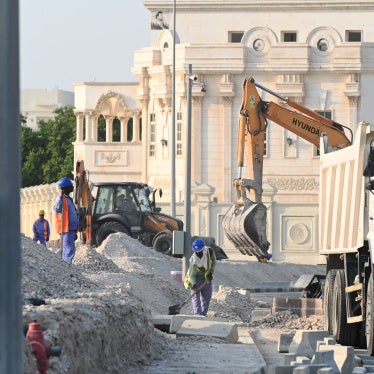In northern Iraq, the authorities’ failure to resolve property disputes between returning Kurds and Arab settlers threatens to undermine security in the region. Iraq’s interim government urgently needs to implement the judicial means to resolve these disputes, which stem from decades of Arabization policies that uprooted hundreds of thousands of Kurds and other non-Arabs.
The 78-page report, “Claims in Conflict: Reversing Ethnic Cleansing in Northern Iraq,” documents the increasing frustration of thousands of displaced Kurds, as well as Turkomans and Assyrians, who are living in desperate conditions as they await a resolution of their property claims. Human Rights Watch details how the U.S.-led Coalition Provisional Authority failed to act even as the situation grew more volatile.
As well as implementing the judicial means to resolve these claims, the Iraqi interim government must take urgent measures to meet the immediate humanitarian needs of thousands of internally displaced Kurds and other non-Arabs living in dire conditions in and around the northern city of Kirkuk. It should also find durable solutions for Arab families who were in turn forced from their homes after the fall of the former Iraqi government in April 2003.
“If these property disputes are not addressed as a matter of urgency, rising tensions between returning Kurds and Arab settlers could soon explode into open violence,” said Sarah Leah Whitson, executive director of Human Rights Watch’s Middle East and North Africa division. “Justice must be done for the victims of what was effectively an ethnic cleansing campaign to permanently alter the ethnic make-up of northern Iraq.” The report documents the rising anger of returning displaced Kurds and other ethnic minorities who increasingly feel the only resolution may be for them to take matters into their own hands.
Since April 2003, thousands of internally displaced Kurds, Turkomans and others have returned to Kirkuk and other Arabized regions to reclaim their homes and lands which have since been occupied by Arabs from central and southern Iraq. These returnees were forcibly expelled from their homes by the government of Saddam Hussein during the 1980s and 1990s.
“Kurds are flocking back to Kirkuk, but the city has little capacity to absorb them,” said Whitson. “They are living in abandoned buildings and tent camps without running water or electricity supplies, and they face precarious security conditions.”
At the same time, little effort has gone into finding just and durable solutions for the so-called Arabization Arabs who, in their turn, have become the latest victims of internal displacement. Many such families fled their homes during the U.S.-led invasion or were forced to do so subsequently, particularly in rural areas, but have remained in the vicinity in makeshift shelters and without basic amenities. Others living in urban areas, notably Kirkuk, never left and are waiting for their own property claims to be resolved.
The Coalition Provisional Authority failed to address the rising tensions in northern Iraq and to implement a strategy to resolve the claims and needs of the different communities there, Human Rights Watch said. When the CPA was formally dissolved on June 28, more than a year after the fall of Saddam Hussein, it had yet to implement a mechanism to resolve competing property claims.
Although legislation was formally passed in January establishing an Iraq Property Claims Commission (IPCC), neither it nor its implementing instructions were finalized until June. More than 6,000 claims have reportedly been lodged at IPCC offices in 10 of the country’s 18 governorates, but the judicial mechanism put in place for the adjudication of these property disputes has still not been implemented. The commission’s statute also failed to adequately address the question of where Arab settler families are to be resettled once they have vacated disputed property. Many of them have lived in Kirkuk and other Arabized areas since the 1970s and have long since severed connections with their area of origin.
“The process of seeking redress for the displaced Kurds and others must not lead to new injustices against Arab settlers,” Whitson said.
Human Rights Watch called on Kurdish political leaders to coordinate efforts to provide humanitarian assistance to internally displaced families who have already returned to reclaim property, and to discourage further returns to former places of residence until property claims are processed.
Background
Arabization first occurred on a massive scale in the second half of the 1970s as the Iraqi government sought to alter the demographic make-up of northern Iraq in order to reduce the political power and presence of ethnic minorities and consolidate control over this oil-rich region. In northern Iraq, probably as many as 250,000 Kurds and other non-Arabs were forcibly expelled from their homes, including an estimated 120,000 among them during the 1990s.
Simultaneously, the Iraqi government brought in landless Arabs from the nearby Al-Jazeera desert and others from central and southern Iraq to settle in their place. Land titles to the rich agricultural lands seized from the Kurds and other non-Arabs were invalidated upon their expulsion, and the land was then leased on annual contracts to Arab farmers. Many of those expelled have since been living in camps for the internally displaced in the northern Kurdish-controlled governorates for over a decade.







